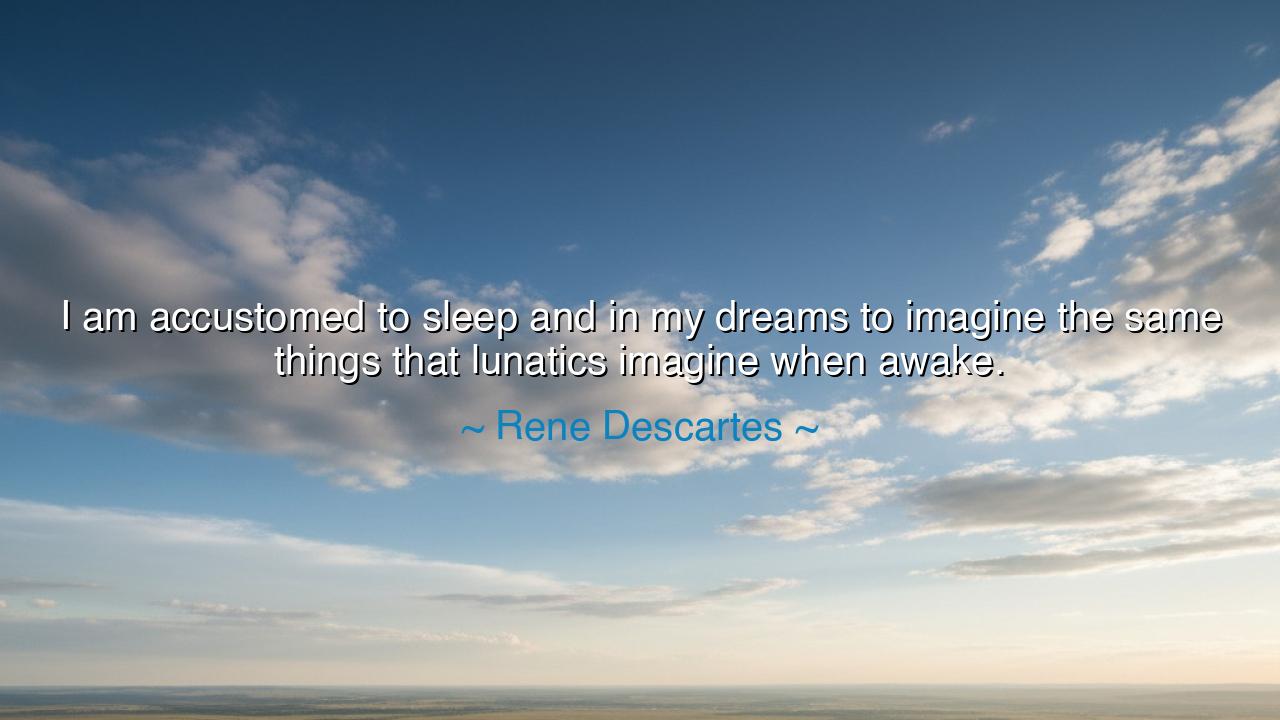
I am accustomed to sleep and in my dreams to imagine the same
I am accustomed to sleep and in my dreams to imagine the same things that lunatics imagine when awake.






In the stillness of thought and shadow, René Descartes, the father of modern philosophy, once confessed with startling honesty: “I am accustomed to sleep and in my dreams to imagine the same things that lunatics imagine when awake.” These words, drawn from his Meditations on First Philosophy, are not the ramblings of doubt alone but the echo of a soul seeking truth in the shifting fog of perception. Descartes reveals in this line the fragile boundary between reason and illusion, between the waking world and the dream. He knew that the mind, for all its brilliance, is both the creator and the deceiver of reality.
The origin of this quote comes from Descartes’ famous Dream Argument, a cornerstone of his philosophical method of doubt. He sought to question everything he believed, to tear down the walls of assumption until only certainty remained. And in his inquiry, he observed that in dreams, he saw and felt and believed with as much conviction as when awake. If dreams could mimic reality so perfectly, how could one ever be sure that the waking world itself was not a grander dream? To imagine as lunatics imagine was to admit that the mind, in all its reason, could still be captive to illusion. Thus, he laid the foundation for one of philosophy’s most haunting questions: What can we truly know?
To say that he imagined “the same things that lunatics imagine when awake” is not an insult to the insane—it is a confession of humility. Descartes recognized that the mind’s power to construct and believe is both divine and dangerous. In dreams, we accept impossibilities as truth: we fly, we converse with the dead, we watch the world dissolve and rebuild in a heartbeat. In madness, the same occurs—but without the mercy of waking. Thus, Descartes draws a mirror between the dreamer and the madman, teaching us that certainty without reflection is as perilous as delusion. The mind, unexamined, is the most seductive liar of all.
Consider the story of Don Quixote, the noble fool created by Cervantes in the same age as Descartes. Quixote’s mind, inflamed by dreams of knightly honor, mistook windmills for giants and inns for castles. Yet in his madness, there was purity; he lived his delusion with courage and heart. Was he truly a lunatic, or merely a man who refused to let go of his dream? Like Descartes’ reflection, the story asks: where does truth end and imagination begin? Perhaps the line is finer than we dare admit.
In Descartes’ meditation, dreams serve not as escapism but as instruments of wisdom. They remind us that perception is fallible—that what we “know” is often woven from the same cloth as illusion. His goal was not despair, but awakening: to reach a foundation of truth so solid that even the wildest dream could not shake it. From this struggle came his immortal conclusion, “Cogito, ergo sum”—“I think, therefore I am.” In this, he found the one certainty left standing when all else dissolved: the existence of the thinker within the dream.
Yet, there is something deeply human in his fear. For who among us has not awoken from a dream so vivid that the waking world felt pale in comparison? Who has not doubted, for a moment, the solidity of their own senses? Descartes’ reflection is not only philosophical—it is spiritual. It warns us that truth is not given to us by the world but must be carved from within through vigilance and reflection. The wise do not blindly trust the mind; they question it, polish it, and temper it like a sword.
The lesson, then, is both humbling and empowering. Doubt is not the enemy of truth—it is its guardian. To question one’s perceptions is not madness, but maturity. Let your dreams teach you humility, and your reason guide you to clarity. When you awaken, remember that the mind is both the stage and the actor, both the painter and the illusion. To live wisely, you must learn to discern which visions are born of truth and which are the whispers of the dream.
So, my seekers of understanding, heed Descartes’ warning: do not fear the uncertainty of the mind—it is the crucible from which wisdom emerges. Dream boldly, but question deeply. For only those who walk through the mists of illusion, unafraid to doubt even their own thoughts, can awaken fully to the luminous truth of being.






AAdministratorAdministrator
Welcome, honored guests. Please leave a comment, we will respond soon